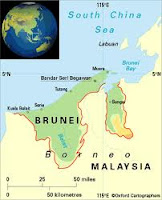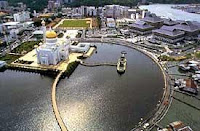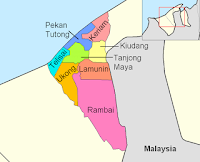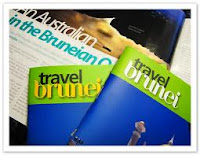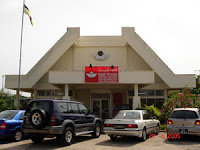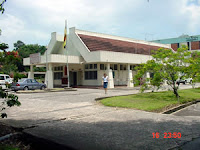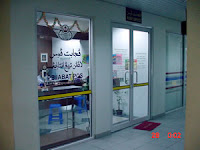Population - Latest statistics put Brunei Darussalam’s population at 406,000 and
growing at an average rate of 1.8% per annum. Brunei Darussalam has a
multi-racial society, comprising of 67% Malays and 15% Chinese. Other
races such as Indians, indigenous ethnic groups and expatriates make up
the rest of the country’s population. Brunei Darussalam has a young
population: 54% are in the 20-54 working age group, another 39% are
below the age of 19 while only 7% are 55 and above.
Climate - Brunei Darussalam has an warm, equatorial climate, with a mean average temperature of around 28⁰C,
with March and April being the warmest, humidity is high throughout the
year about 79%. Temperature range from 23-32 Degree Celsius, while
rainfall varies from 2,500mm, annually on the coast to 7,500mm in the
interior. There is no distinct wet season. Brunei is not the direct path
of cyclones and typhoons that plague the surrounding regions, while
earthquakes and severe flooding are non-existent.
Capital - The capital city of Brunei Darussalam is Bandar Seri Begawan with busy business areas that are
filled with new building, offices and shop lots and Government
department , has seen even more development in recent times.
Language
- Bahasa Melayu is Brunei official language but English is widely spoken and
understand by the greater part of Brunei Darussalam's population.
Although an important minority speak Chinese dialects and English is
widely used in commerce, education and government. the local variety of
Malay (Kedayan or Bukit Malay) is quite different to Standard Malay.
Brunei Currency rate - The currency is the Brunei Darussalam Dollar ( Br$ = 100 cent ).
Notes are in the denominations Br$10,000, 1000, 500, 100, 50, 25, 10, 5
and 1 and coins are in the denominations 50, 20, 10, 5 and 1 cents. The
Brunei Darussalam Dollar is officially on a par with the Singapore
Dollar.
Passports and Visas
- Passports are required from all visitors along with visas as follows;
Australia, Britain, Germany, Greece, Belgium, Denmark, France, Italy,
Luxembourg, the Netherlands, Spain, Sweden, and other EU countries,
Canada, Indonesia, Japan, Korea, Liechtenstein, Maldives, Norway, the
Philippines, Switzerland, Thailand, Malaysia, New Zealand, Singapore,
the United States, U.S, and other EU visitors. All Visitors are required
to have a return ticket and must possess sufficient funds to support
themselves while in country. Nationaks of Cuba, Israel and Korea (DPR)
may not be granted entry to Brunei Darussalam.

Shopping and Business Hours
In Brunei Darussalam - Part of any travel agenda is shopping for local items of interest.
Special purchase here might include hand worked silverware, brassware
and bronze ware as jugs, trays, gongs, boxes, napkin rings, spoons and
bracelets, hand woven sarongs, basket and mats of pandan leaves.
Shopping centers at Bandar Seri Begawan, Seria and Kuala Belait offer
local product and imported items. Not to be missed would the 'Tamu'
Night Market in Bandar Seri Begawan which is open from early morning to
late at night and sells many fruits, spices, poultry and vegetables, as
well as antiques. Food is available there at the lowest prices in town.
Normal shopping hours are Mon-Sat 08:00-21:00.
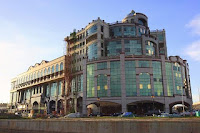
People and Religion
In Brunei Darussalam - Islam is the official religion of Brunei Dareussalam as started in
the Brunei Constitution, with His Majesty the Sultan and Yang Di-Pertuan
as the head of the Islamic faith in the country. Thus, Islam plays a
control role in the life of every Muslim in Brunei Darussalam. Other
faiths practiced in the State include Christianity and Buddhism. Malay,
which also included Brunei ethnic/indigenous communities of Malay,
Kedayan, Tutong, Belait, Bisaya, Dusun and Murut.

Judiciary - Brunei Darussalam’s judiciary system is based on English Common Law.
The Supreme Court comprises the High Court and the Court of Appeals,
while the Subordinate Court consists of the Magistrate's Courts. A
Syariah Court also co-exists with the Supreme Court and deals with
Islamic laws. For Muslims, Islamic Syariah Law supersedes civil law in a
number of areas. In 1991 the Intermediate Court was established with
extensive civil and criminal jurisdiction; although it does not deal
with capital offences.
Education - His Majesty’s Government provides free education to all Brunei
Darussalam citizens and permanent residents who attend government
schools. While the current education policy priorities the Malay
Language as the official national language, English is most commonly
used as the medium of instruction. Arabic is also used in religious
schools.
The literacy rate in Brunei Darussalam is about 94.9%, which is
among the highest in the world. The United Nations Development Programme
has ranked Brunei Darussalam 30th in the “High Human Development”
category.
Healthcare - Healthcare is a priority to His Majesty’s Government by demonstrated
in the provision of a comprehensive health care system for the people
of Brunei Darussalam. The main health policy is to provide high quality
yet cost effective health care in order to maintain a high standard of
living in a clean and healthy environment. Among the objectives are to
reduce the infant mortality rate, diseases and disability, promote a
healthy way of life and improve the environment.
Brunei Darussalam’s health services are ranked among the best in
Asia. Citizens of Brunei Darussalam are charged a nominal fee at public
hospitals and health clinics. Apart from public health care there are
also private clinics and a private medical centre for those who seeking
alternatives.
Source :
http://www.bedb.com.bn/




